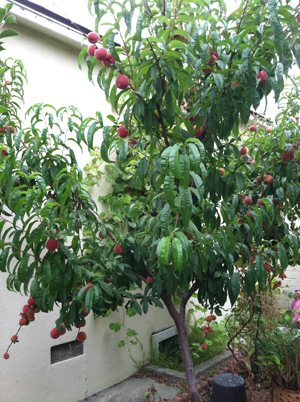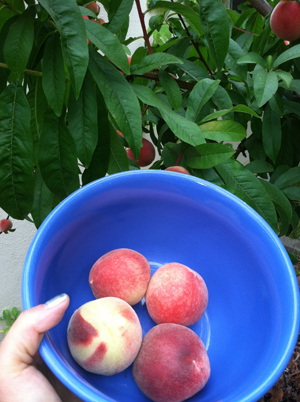Summer is definitely here when the blushing Babcock peaches along the driveway begin to ripen. Earlier in the season, we forgot to prune off the tiniest of the fruit to encourage fewer larger, sweeter specimens. The result? Smaller, perfectly sweet, oozing, tender, white-fleshed, fuzzy-wrapped peachy poppers.
Alas, we despair for harried urban edible gardeners — something always gets in the way of perfect fruit tree husbandry (like updating the website or traveling to meetings).
Perhaps there is a lesson to be learned from the systemic neglect of fruit trees. These peaches are not coddled with regular applications of greywater; and rainwater baths from the two rain barrels were finished by late April. Of course, we haven’t been completely derelict in our garden duties. The planters are cut from the old driveway, so copious amounts of free Chinese elm leaf mulch are maintained at the feet of the trees in an effort to uncompact the beds beneath. Compost Teana occasionally offers a bucket of Activated Aerobic Compost Tea (AACT). But new mulch and applications of AACT are few and far between. No, these trees are pressed into the service of our bellies with all the shackles of servitude; they are dry-farmed and stressed out. And under this strain, the tree, like all fruit trees, is programmed to put forth a multitude of sweet children (fruit) to ensure its genetic survival. Our bellies and mouths sing with gratitude!
Would the results be as delicious with a greywater or rainwater capture/reuse system? Maybe. But, who cares?This tree is not enslaved by the production of fruit for market — filled with water to better tip the scale; nor is its prodgeny subscribed to by every family in the neighborhood. This tree feeds our family and neighbors. By August, we’re likely to be ready to put aside our passion for peaches (till next summer) and move on to the cherries and early apples.
The idea of cultivating sweeter, smaller harvests with dry farming the urban edible garden is something worth considering in the rush to convert every home into a greywater works justified by the planting of fruit trees. Sure, we get “rid” of the water; but, are we producing the best results with the practice? We’ll contemplate that one over a nice cobbler.


